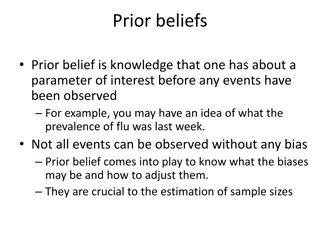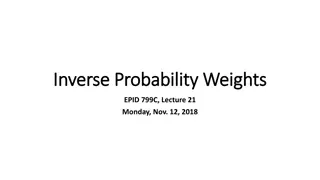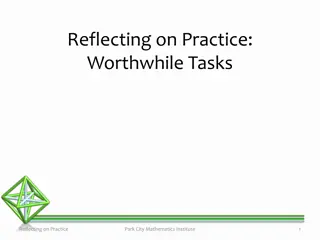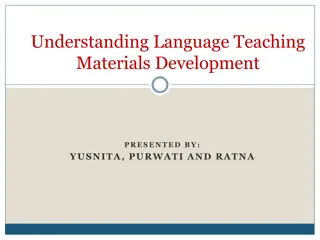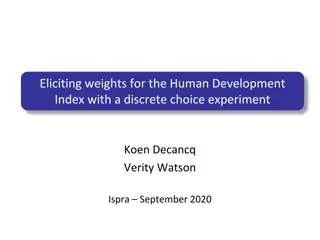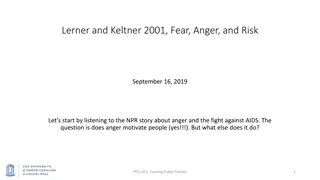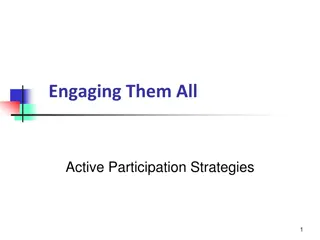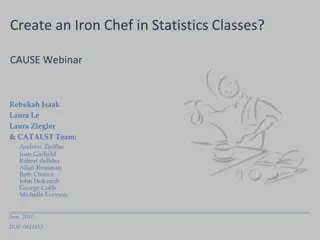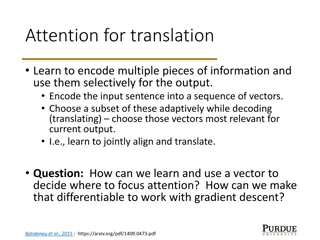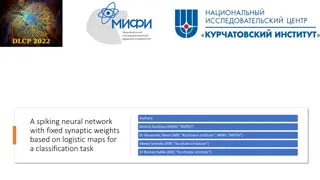Generalizing Research on Older Adults in Seattle Integrated Health System
This research project led by Laura Gibbons focuses on generalizing findings from the Adult Changes in Thought (ACT) study in a Seattle integrated health delivery system to all older adults in the region. By comparing ACT participants with the current Seattle area population and using survey weights
1 views • 29 slides
Understanding Weighting Strategies for Disaggregated Racial-Ethnic Data
Delve into the importance of weighting strategies for disaggregated racial-ethnic data in health policy research. Learn about the purpose of weighting, considerations, and when weights are unnecessary. Discover how survey weights ensure the representativeness and generalizability of data to target p
3 views • 56 slides
Understanding Prior Beliefs and Eliciting Expert Opinions in Parameter Estimation
Prior beliefs play a crucial role in estimating parameters of interest before observing events. They can be elicited from sources like meta-analyses, literature, and expert opinions. Experts' beliefs are often measured using Beta or Normal distributions for different outcomes. Eliciting prior belief
0 views • 22 slides
Understanding Gage Weights and Precipitation Methods in Hydrologic Modeling
Exploring the concept of gage weights and precipitation methods in hydrologic modeling using the HEC-HMS software. Dive into the pros and cons of flexible gage weighting, calibration processes, and best practices for estimating time and depth weights. Discover how to set up a gage weights model, inc
0 views • 11 slides
Understanding Perceptron Learning Algorithm in Neural Networks
Perceptron is the first neural network learning model introduced in the 1960s by Frank Rosenblatt. It follows a simple and limited (single-layer model) approach but shares basic concepts with multi-layer models. Perceptron is still used in some current applications, especially in large business prob
2 views • 54 slides
Weekly Language Review Week 12
This week's language review includes exercises on simplifying sentences, identifying misspelled words, understanding figures of speech, and differentiating between phrases, independent clauses, and dependent clauses. It also covers definitions, word roots, eliciting responses, punctuation, and anton
0 views • 20 slides
Historical Weights and Cost of Capital Analysis
The content discusses historical weights using market value weights for different securities like mortgage bonds, preferred stock, and common stock. It also delves into determining the overall cost of capital based on market value weights, including debt, preferred stock, common stock, and retained
0 views • 36 slides
Understanding Inverse Probability Weights in Epidemiological Analyses
In epidemiological analyses, inverse probability weights play a crucial role in addressing issues such as sampling, confounding, missingness, and censoring. By reshaping the data through up-weighting or down-weighting observations based on probabilities, biases can be mitigated effectively. Differen
0 views • 25 slides
Exploring Weight Measurement in Mathematics for Class III
This presentation delves into the concept of weight in mathematics for Class III students. It covers topics like identifying objects by weight, comparing weights, understanding units of weight, conversions, addition and subtraction of weights, and practical applications of weight in daily life and p
0 views • 35 slides
Lessons Learned: Valuing Health for Children, Adults, and Caregivers
Exploring the impact of COVID-19 on health valuation for children, adults, and caregivers through economic evaluation, case examples, and eliciting utilities for child health. The study delves into family spillover effects, expanded value frameworks, and measuring QALY losses associated with COVID-1
0 views • 59 slides
Strategies for Effective Questioning in Title IX Hearings: Part 1
Learn evidence-based questioning strategies to engage parties and witnesses effectively in Title IX hearings. This includes creating a questioning plan, practicing empathy, cultivating rapport and cooperation, active listening, addressing discrepancies, and avoiding unproductive techniques. Utilize
0 views • 15 slides
Best Sash Weights Manufacturer in Epping Upland
Are you looking for the Best Sash Weights Manufacturer in Epping Upland? Then contact Trade Sash Weights Ltd. They produce an extensive range of sizes of Sash Lead Weights to be used in traditional box sash windows. They currently supply Lead Sash We
0 views • 6 slides
Understanding Cosine Similarity in Inverted Index for Querying
In this document, Dr. Claudia Pearce explains how to build and query from an inverted index, focusing on calculating the Cosine Similarity. The process involves calculating the dot product of terms in the document and query, updating sums based on term weights, and understanding the significance of
0 views • 15 slides
Strategies for Effective Feedback in Clerkships
Explore the importance of upward feedback in clerkships, tips for eliciting valuable feedback from preceptors, and insights on resolving conflicts and building resilience in medical education. Discover specific advice for success in each clerkship and recommendations for giving upward feedback effec
0 views • 22 slides
Understanding Tone and Mood in Writing
Explore the concepts of tone and mood in writing, how they are defined, and their impact on creating an atmosphere and eliciting emotions in the reader. Discover how tone reflects the author's attitude and the multiple tones that can exist in a piece of writing. Dive into the general atmosphere crea
0 views • 34 slides
Reflecting on Effective Math Tasks at Park City Mathematics Institute
Explore various math tasks presented at the Park City Mathematics Institute, focusing on promoting discussions and eliciting student understanding. Tasks are designed to encourage critical thinking and reasoning, emphasizing the importance of errors in learning opportunities. Participants engage in
2 views • 18 slides
Prioritizing What Matters in Healthcare: A Comprehensive Approach
Focusing on what truly matters in healthcare involves aligning care goals, optimizing medications, maintaining mobility, promoting mental acuity, and fostering collaboration. Advance care planning, identifying patient priorities, and eliciting what matters are crucial components for enhancing patien
0 views • 26 slides
Understanding Triad Tests in Cognitive Anthropology
Triad tests are a valuable tool in cognitive anthropology, originally introduced by George Kelly in 1955. They involve presenting individuals with sets of three items and eliciting responses based on similarity or dissimilarity. This method allows researchers to explore differences in cognition acro
1 views • 27 slides
Understanding Sample Design and Weights in International Education Studies
This lecture covers the design of key international surveys, response thresholds for countries, use of survey weights, replication weights, and their application using the TALIS 2013 dataset. It also explains the target population definition for PISA, exclusion rates in selected countries, stratific
0 views • 43 slides
Exploring Language Teaching Materials Development
Language teaching materials play a crucial role in language learning processes. They can be informative, instructional, experiential, eliciting, or exploratory. Materials development involves various processes such as evaluation, adaptation, design, production, exploitation, and research. Frameworks
0 views • 30 slides
Utilizing Replicate Estimate (Repest) for PISA and PIAAC Data Analysis in Stata
Explore how to use the Stata routine Repest for complex survey designs, accommodating final weights, replicate weights, and imputed variables in PISA and PIAAC data analysis. Learn to install and apply Repest to compute means of variables while accounting for sampling variance, clustering, and strat
0 views • 28 slides
Effective Trial Advocacy: Cross-Examination Strategies by Professor Stephen A. Saltzburg
Enhance your trial advocacy skills with effective cross-examination strategies discussed by Professor Stephen A. Saltzburg at the District Court of the Virgin Islands mid-year conference. Learn techniques such as eliciting favorable information, attacking witness credibility, and conducting multiple
0 views • 41 slides
Cost Indexes and Pupil Weights in Public Finance Seminar
Explore the importance of cost indexes and pupil weights in public finance, focusing on expenditure needs, cost disparaties, and aid programs. Key concepts like expenditure need, cost index, and pupil weight are discussed along with the cost function and expenditure requirements to meet performance
0 views • 32 slides
Eliciting Weights for Human Development Index with Discrete Choice Experiment
A study conducted by Koen Decancq and Verity Watson in September 2020 explores the process of eliciting weights for the Human Development Index (HDI) using a discrete choice experiment. The research delves into the trade-offs individuals make between different dimensions of the HDI, providing insigh
0 views • 46 slides
Enhancing Science Teaching Practices Through Virtual Avatar Discussions
Pre-service middle school science teachers engage in practice sessions using virtual avatars to lead discussions on natural phenomena. The use of avatars provides a safe environment for attending to and responding to ideas and reasoning. This innovative approach aligns with high-leverage teaching pr
0 views • 16 slides
The Impact of Emotions on Risk Assessment and Decision Making
Emotional states, such as fear and anger, play a significant role in influencing individuals' risk assessments and decision-making processes. Fearful individuals tend to overestimate risks and make risk-averse choices, while angry individuals exhibit optimistic risk assessments and are more inclined
0 views • 12 slides
Development of Student Weight Recommendations in Education Studies
In this document, recommendations for student weights in education studies are outlined based on the analysis of various factors such as at-risk student classification, English learners, and special education needs. The study team suggests specific weights to allocate resources effectively for inter
0 views • 8 slides
Factors Influencing Delayed Prescribing in UK Primary Care
Factors influencing delayed prescribing in UK primary care were examined through a study involving general practitioners (GPs) and prescribing scenarios for respiratory tract infections. Clinical features, patient preferences, and practitioner tendencies were key factors affecting the decision to pr
0 views • 5 slides
Understanding the Regulation of Hormone Secretion and Feedback Mechanisms
Hormone secretion is tightly regulated to prevent overproduction or underproduction. It involves various factors such as nervous system signals, chemical changes in the blood, and feedback mechanisms. Hormones play a vital role in maintaining homeostasis by acting on target cells and eliciting speci
0 views • 17 slides
Understanding the Impact of Audio-Visual Content on Movie Trailer Viewers
Movie trailers use various techniques such as music, close-ups, and genre cues to evoke emotional responses and engage viewers. These effects, including chills, gender differences, and memory associations, are strategically crafted to drive sales by leveraging natural human tendencies and psychologi
0 views • 20 slides
Enhancing Active Participation Strategies for Student Engagement
Engaging Them All Active Participation Strategies by Anita L. Archer, Ph.D., focuses on the importance of eliciting frequent responses from students to create a positive learning environment, increase engagement and accountability, and promote desired behaviors. The resource emphasizes the benefits
0 views • 72 slides
Cryptocurrency Diversification for Portfolio Optimization
Exploring the suitability of cryptocurrencies for diversification using Modern Portfolio Theory. The study aims to determine optimal portfolio weights for cryptocurrencies, assess the stability of these weights over time, and provide insights on cross-country evidence. Key considerations include ris
0 views • 22 slides
Polymer Molecular Weight Exercise Analysis
This exercise involves calculating the number average and weight average molecular weights, as well as the polydispersity index (PDI) for a sample of polystyrene composed of fractions with different molecular weights. The analysis includes determining the number of moles in each fraction, calculatin
0 views • 7 slides
Enhancing Wi-Fi Authentication Using Channel State Information
This research discusses enhancing Wi-Fi authentication by actively eliciting channel state information (CSI) to detect spoofing attacks. The challenge lies in obtaining the legitimate user's CSI and comparing it in real-time due to changing CSI and user traffic variations. The proposed approach invo
0 views • 27 slides
Understanding Dijkstra's Algorithm for Shortest Paths with Weighted Graphs
Dijkstra's Algorithm, named after inventor Edsger Dijkstra, is a fundamental concept in computer science for finding the shortest path in weighted graphs. By growing a set of nodes with computed shortest distances and efficiently using a priority queue, the algorithm adapts BFS to handle edge weight
0 views • 30 slides
Social Engineering Attack Framework (SEAF) - Understanding the Process
Social Engineering Attack Framework (SEAF) provides a structured approach to executing social engineering attacks. It defines the attack framework, assists in planning and execution, and helps in verifying the success of the attack. The process involves identifying the attack goal, assessing potenti
0 views • 16 slides
Creating an Iron Chef in Statistics Classes
Explore the innovative approach of implementing an Iron Chef model in statistics classes through the use of Model-Eliciting Activities (MEAs) to engage students in statistical thinking. Discover how the CATALST research foundations have led to a radical shift in content and pedagogy, emphasizing rea
0 views • 27 slides
Understanding Attention Mechanism in Neural Machine Translation
In neural machine translation, attention mechanisms allow selective encoding of information and adaptive decoding for accurate output generation. By learning to align and translate, attention models encode input sequences into vectors, focusing on relevant parts during decoding. Utilizing soft atten
0 views • 17 slides
Anytime Weighted MaxSAT with Improved Polarity Selection and Bit-Vector Optimization
Weighted MaxSAT is a optimization problem where targets are assigned weights and hard clauses must be satisfied. The goal is to find a model that maximizes the overall weight of satisfied target bits. The formulation involves unit clauses associated with integer weights, with a focus on improving po
0 views • 49 slides
Spiking Neural Network with Fixed Synaptic Weights for Classification
This study presents a spiking neural network with fixed synaptic weights based on logistic maps for a classification task. The model incorporates a leaky integrate-and-fire neuron model and explores the use of logistic maps in synaptic weight initialization. The work aims to investigate the effectiv
0 views • 8 slides


